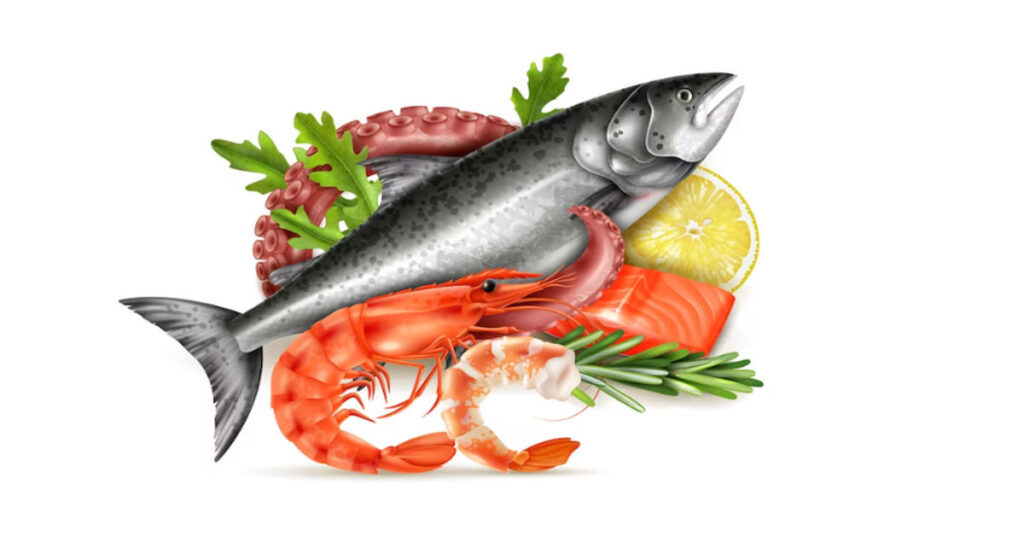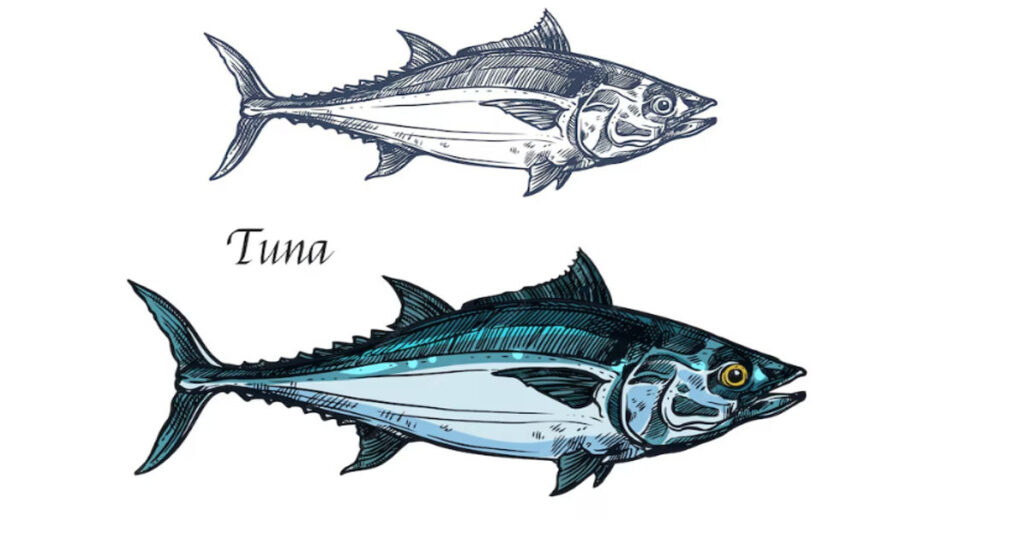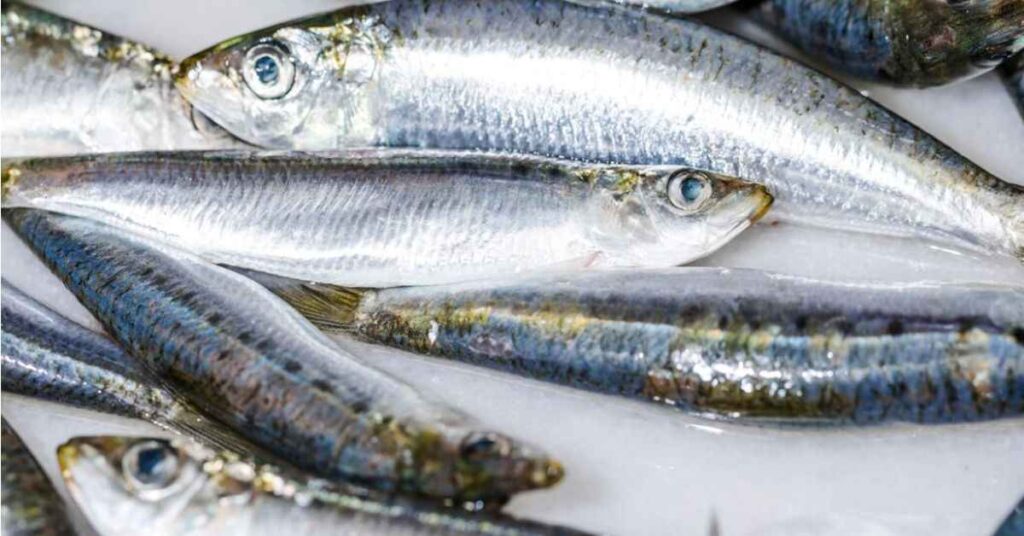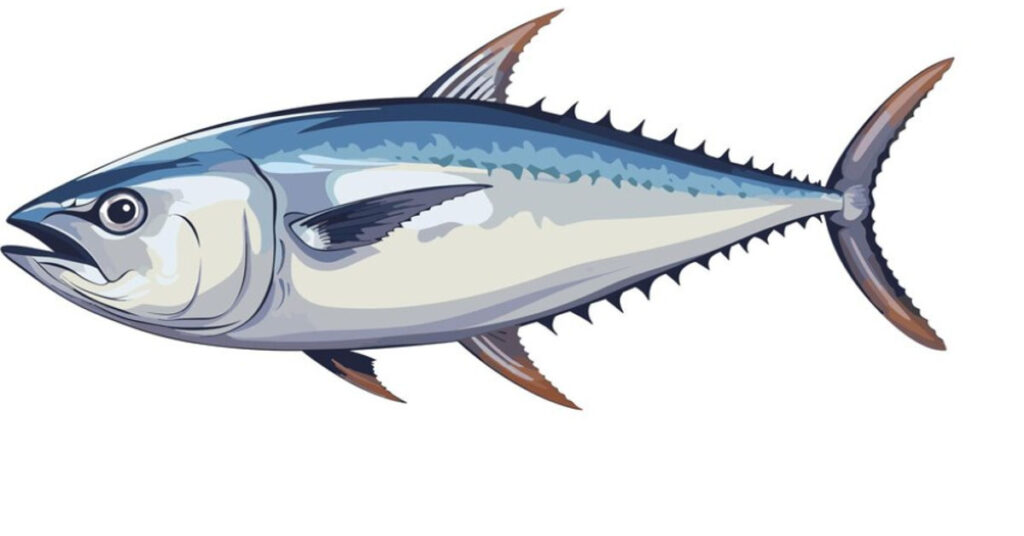- Salmon
- Tuna
- Cod
- Sardines
- Mackerel
Salmon

Salmon is a highly nutritious and flavorful fish that is widely consumed around the world. It belongs to the Salmonidae family and is native to freshwater and marine environments in the North Atlantic and Pacific oceans. Salmon is prized for its rich, oily flesh and distinct flavor profile.
Nutritional Profile:
Salmon is an excellent source of high-quality protein, containing all essential amino acids necessary for human health. However, what sets salmon apart is its exceptional omega-3 fatty acid content, particularly EPA (eicosapentaenoic acid) and DHA (docosahexaenoic acid). These omega-3 fatty acids are crucial for brain health, heart health, and reducing inflammation in the body. Additionally, salmon is rich in vitamins and minerals, including vitamin D, vitamin B12, selenium, and potassium.
Health Benefits:
Incorporating salmon into your diet can provide numerous health benefits. The omega-3 fatty acids found in salmon are associated with a reduced risk of heart disease, improved cognitive function, and decreased inflammation. Additionally, the protein content in salmon supports muscle growth and repair, while vitamin D helps maintain bone health and supports immune function.
Versatility:
Salmon is a versatile fish that can be prepared in various ways, including grilling, baking, broiling, poaching, and even raw sushi or sashimi. Its robust flavor pairs well with a wide range of ingredients and seasonings, making it a favorite choice for many culinary dishes.
Sustainability:
When purchasing salmon, it’s essential to consider sustainability. Wild-caught Alaskan salmon, particularly those certified by the Marine Stewardship Council (MSC), is often considered the most sustainable option. Additionally, farmed salmon from responsible aquaculture practices can also be a sustainable choice.
Overall, salmon is not only delicious but also incredibly nutritious, offering a wide array of health benefits. Incorporating salmon into your diet regularly can help support overall well-being and provide essential nutrients for optimal health.
Tuna:

Tuna is a widely consumed fish species belonging to the family Scombridae. It is found in both temperate and tropical oceans around the world and is highly valued for its meaty texture and rich flavor.
Nutritional Profile:
Tuna is an excellent source of high-quality protein, containing all the essential amino acids necessary for human health. It is also rich in omega-3 fatty acids, particularly EPA (eicosapentaenoic acid) and DHA (docosahexaenoic acid), which are beneficial for heart health, brain function, and reducing inflammation. Tuna is low in saturated fat and calories, making it a nutritious choice for those looking to maintain a healthy diet. Additionally, tuna is a good source of various vitamins and minerals, including vitamin D, vitamin B12, selenium, and niacin.
Health Benefits:
Incorporating tuna into your diet can provide numerous health benefits. The omega-3 fatty acids found in tuna are associated with a reduced risk of heart disease, improved cognitive function, and decreased inflammation. Additionally, the high protein content in tuna supports muscle growth and repair, while vitamin D helps maintain bone health and supports immune function.
Versatility:
Tuna is a versatile fish that can be prepared in various ways. It can be enjoyed raw as sushi or sashimi, grilled, baked, broiled, or pan-seared. Its firm texture and rich flavor make it suitable for a wide range of culinary applications, from salads and sandwiches to main courses and appetizers.
Sustainability:
When purchasing tuna, it’s essential to consider sustainability. Some species of tuna, such as bluefin tuna, are overfished and may be subject to depletion if not harvested responsibly. Look for tuna products certified by organizations like the Marine Stewardship Council (MSC) or those labeled as sustainably sourced to ensure that you’re making an environmentally friendly choice.
Overall, tuna is not only delicious but also incredibly nutritious, offering a wide array of health benefits. Incorporating tuna into your diet regularly can help support overall well-being and provide essential nutrients for optimal health.
cod:

Cod is a popular fish species belonging to the Gadidae family. It is found in both the Atlantic and Pacific oceans and is widely consumed in various culinary traditions around the world.
Nutritional Profile:
Cod is a lean white fish that is low in fat and calories but rich in high-quality protein. A 3-ounce serving of cooked cod typically provides around 90 calories and 20 grams of protein. Additionally, cod is a good source of vitamins and minerals, including vitamin B12, vitamin B6, niacin, phosphorus, and selenium. It is also low in mercury, making it a safe choice for regular consumption.
Health Benefits:
Incorporating cod into your diet can provide numerous health benefits. Its high protein content makes it an excellent choice for supporting muscle growth and repair. Additionally, cod is rich in vitamin B12, which is essential for nerve function and the production of red blood cells. The niacin found in cod helps support cardiovascular health, while the selenium contributes to antioxidant defense mechanisms in the body.
Versatility:
Cod is a versatile fish that can be prepared in various ways. It can be baked, broiled, grilled, steamed, or pan-seared. Its mild flavor and flaky texture make it suitable for a wide range of culinary applications. Cod is often used in fish and chips, fish tacos, seafood stews, and baked dishes.
Sustainability:
When purchasing cod, it’s essential to consider sustainability. Some populations of cod have been overfished, leading to concerns about the long-term viability of cod fisheries. Look for cod products certified by organizations like the Marine Stewardship Council (MSC) or those labeled as sustainably sourced to ensure that you’re making an environmentally friendly choice.
Overall, cod is a nutritious and versatile fish that can be enjoyed as part of a balanced diet. Incorporating cod into your meals regularly can provide essential nutrients and contribute to overall health and well-being.
sardines:

Sardines are small, oily fish belonging to the Clupeidae family. They are found in abundance in various oceans around the world and are often harvested for their flavorful and nutritious meat.
Nutritional Profile:
Sardines are packed with nutrients despite their small size. They are particularly rich in omega-3 fatty acids, calcium, vitamin D, and protein. A single serving of sardines provides a significant portion of the recommended daily intake for these essential nutrients. Additionally, sardines are low in contaminants such as mercury, making them a safe and healthy choice for regular consumption.
Health Benefits:
Incorporating sardines into your diet can provide numerous health benefits. The omega-3 fatty acids found in sardines are beneficial for heart health, brain function, and reducing inflammation in the body. The high calcium content in sardines supports bone health and may help prevent osteoporosis. Sardines are also an excellent source of vitamin D, which is essential for calcium absorption and immune function.
Versatility:
Sardines are versatile fish that can be enjoyed in various ways. They can be eaten fresh, canned, or smoked. Sardines are commonly used in salads, sandwiches, pasta dishes, and as toppings for pizzas. They can also be mashed and spread on toast or crackers for a quick and nutritious snack.
Sustainability:
Sardines are considered a sustainable seafood choice due to their abundance and fast reproduction rate. They are often harvested using methods that have minimal impact on marine ecosystems, such as purse seining and trolling. Look for sardines labeled as sustainably sourced or certified by organizations like the Marine Stewardship Council (MSC) to ensure that you’re making an environmentally friendly choice.
Overall, sardines are a nutrient-dense and environmentally sustainable fish option that can be enjoyed as part of a healthy diet. Incorporating sardines into your meals regularly can provide essential nutrients and contribute to overall health and well-being.
Mackerel

Mackerel is a family of fish comprising over 30 species found in both temperate and tropical seas. It is known for its rich flavor and is widely consumed around the world.
Nutritional Profile:
Mackerel is highly nutritious and rich in omega-3 fatty acids, protein, vitamin B12, selenium, and various other vitamins and minerals. A 3-ounce serving of mackerel provides a significant portion of the recommended daily intake of omega-3 fatty acids, which are essential for heart health, brain function, and reducing inflammation.
Mackerel is also an excellent source of high-quality protein, containing all the essential amino acids necessary for human health. Additionally, mackerel is rich in vitamin B12, which is important for nerve function and the production of red blood cells, and selenium, which contributes to antioxidant defense mechanisms in the body.
Health Benefits:
Incorporating mackerel into your diet can provide numerous health benefits. The omega-3 fatty acids found in mackerel are associated with a reduced risk of heart disease, improved cognitive function, and decreased inflammation. The high protein content in mackerel supports muscle growth and repair, while vitamin B12 and selenium contribute to overall health and well-being.
Versatility:
Mackerel is a versatile fish that can be prepared in various ways. It can be grilled, baked, smoked, or pan-seared. Mackerel is often used in salads, pasta dishes, sandwiches, and appetizers. Its bold flavor pairs well with a wide range of ingredients and seasonings.
Sustainability:
Mackerel species vary in their sustainability status, so it’s essential to choose species that are harvested responsibly. To be sure you’re choosing sustainably, look for mackerel that has been certified by groups like the Marine Stewardship Council (MSC).


